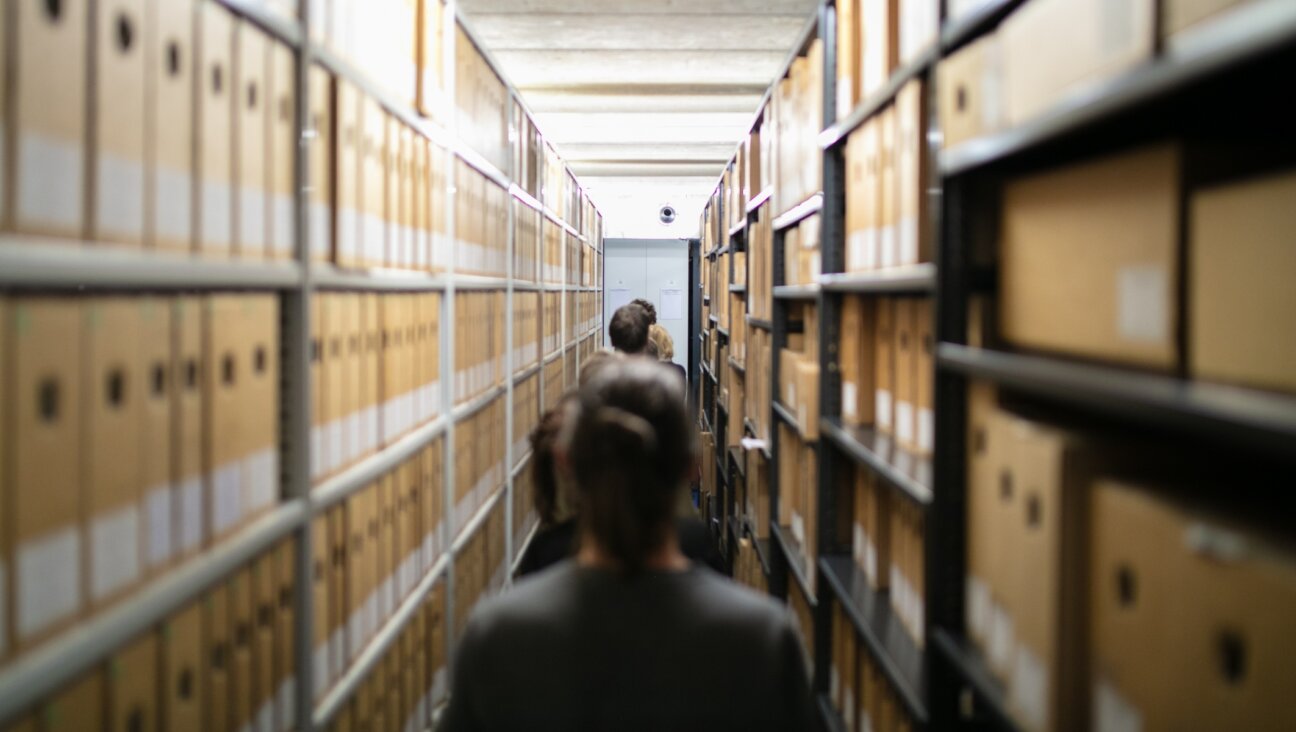Putting Our People’s Past on the Negotiating Table
Who owns the keys to the Jewish past?
Last year, the Palestinian Authority made headlines by publicly claiming ownership of the Dead Sea Scrolls, the fragments of hundreds of ancient manuscripts discovered in the caves of Qumran in the West Bank between 1947 and 1956 and which have been in Israel’s possession since 1967. Now, the government of Jordan is following suit, asserting that it is the scrolls’ rightful owner. Both parties demanded that the Canadian government seize the scrolls, which have been on display in Toronto, and turn them over — demands that Canada has rebuffed.
Israel, of course, will not give up the scrolls. Not just because the Israelis have had them for much longer than the Jordanians ever did, or because they believe they can do a better job of preserving the scrolls and ensuring their access to international scholars than the Palestinians would. Rather, it is because the scrolls, written in Hebrew, Aramaic and Greek during the late Second Temple era, are Jewish documents, shedding incredibly important light on life among some of the Jewish sects of the period.
But even if the micro-flap over ownership of the Dead Sea Scrolls is not a serious one, it does raise a crucial issue regarding any future agreement over the creation of a Palestinian state. Wherever the borders may be drawn, what is clear is that underneath the Palestinians’ future homeland lie the ruins of ancient Israel — ruins that archaeologists from all over the world have labored hard to begin uncovering over the last 40 years. From Shiloh to Hebron, from the mountains above Nablus to the City of David in eastern Jerusalem, a great many of the most important insights about life in ancient Israel have come from archaeological expeditions carried out in lands captured by Israel in the 1967 war.
Why is this issue serious enough to be considered in peace negotiations? After all, aren’t the safety and security of Israelis, and the rights of Palestinians, much more important?
For Jews, embracing, remembering and preserving our past is an existential need. We can argue about how much land to give up, and whether to dismantle settlements. We can disagree over so many things that define our Judaism — the meaning of Halacha, the role of women in rituals, homosexuality, the authorship of the Bible. But there is one thing on which all movements of Judaism have always agreed: the importance of the past in defining who we are.
For thousands of years, Jews have clung feverishly to their past in facing every trial, and celebrated their history at every opportunity. Every Jewish holiday is a commemoration of our ancient heritage; every prayer a recollection of our patriarchs; every greeting to fellow Jews from around the world spoken in a language redolent with biblical idiom; every social movement an effort to recapture the dreams of the prophets.
It is our past, in other words, that makes us Jews.
Our archaeological heritage gives us the most poignant, tactile connection to the past possible. It has been the singular gift of modern science to the Jewish spirit; in an era when everything always looks forward, pushing us to shed our inheritance at every turn, it has allowed us to see what once was, to decipher our own ancient languages on clay tablets, to get a feel for how and where our forebears lived, to squabble over how literate they were, how they worshipped, and which parts of the biblical story are historical and which are not. Modern archaeology has added a totally new dimension to our engagement with ourselves, giving us access to things that only recently were buried in time, unreachable.
Nor can we say that this grand project is anywhere near completion. Despite decades of intense digging in the Land of Israel, it is only in recent years that some of the most important biblical-era discoveries have been made — such as the discovery of a giant altar on Mount Eval that may be the very altar that Joshua built after the Israelites crossed the Jordan River; or the discovery in 2005 of what appears to be the palace of King David in eastern Jerusalem (full disclosure: at the time of this discovery I was the editor of a public affairs journal published by the Shalem Center, which was a sponsor of the dig), or, just in the last few months, the first-ever discovery of an ancient Hebrew text dating to the time of David and Solomon. Each of these discoveries changes the way historians tell the story of our past, rekindling the Jewish imagination and infusing the Jewish historical understanding.
What will become of all this if the lands of ancient Israel are turned into a modern Palestinian state? So far, the prospects are not good. Western archaeologists have increasingly steered clear of areas under Palestinian control. Archaeology under Palestinian rule has been either neglected or politicized.
Meanwhile, there has been massive destruction of antiquities under the Temple Mount. Thousands of tons of rubble and dirt were removed between 1996 and 1999 by the then P.A.-dominated Waqf, the Islamic trust that manages the Mount’s Muslim holy sites, in order to build a spectacularly large underground mosque. This was all done without any archaeological supervision. In the discarded piles were found hundreds of items dating to the Second Temple and Roman periods — items whose value to scholars was largely lost by being removed from the setting in which they had lain.
Some argue that the destruction is a deliberate effort by Palestinians to rid the Temple Mount of any proof of its Jewish history. But even if it was simply collateral damage from the Waqf’s construction project, we are nonetheless talking about a vast assemblage of what could have been real knowledge, Jewish knowledge, now lost forever.
Unless something dramatic changes, we should assume that the same thing would happen in any area under Palestinian control: looting, destruction, rank politicization and an absolute disregard for the biblical past.
Israel’s leaders will need to decide whether this is a price worth paying for peace. But unlike the question of uprooting settlements, which is essentially an Israeli issue, the question of giving up our archaeological heritage is one that every Jew — indeed, anyone who sees the biblical past as his or her own — has a personal stake in.
David Hazony is a Jerusalem-based writer. His first book, “The Ten Commandments: How Our Most Ancient Moral Text Can Renew Modern Life,” is scheduled to be published by Scribner this coming September.
A message from our Publisher & CEO Rachel Fishman Feddersen

I hope you appreciated this article. Before you go, I’d like to ask you to please support the Forward’s award-winning, nonprofit journalism so that we can be prepared for whatever news 2025 brings.
At a time when other newsrooms are closing or cutting back, the Forward has removed its paywall and invested additional resources to report on the ground from Israel and around the U.S. on the impact of the war, rising antisemitism and polarized discourse.
Readers like you make it all possible. Support our work by becoming a Forward Member and connect with our journalism and your community.
— Rachel Fishman Feddersen, Publisher and CEO























